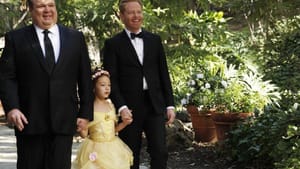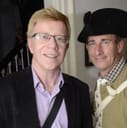Stay in the Loop
BSR publishes on a weekly schedule, with an email newsletter every Wednesday and Thursday morning. There’s no paywall, and subscribing is always free.
Fathers Know Best?
Terrence McNally’s ‘Mothers and Sons’ at PTC (second review)

Some time ago, a colleague invited me to share a drink with two of his younger friends. We were three gay men and a woman who had a lot to talk about, including same-sex marriage.
The woman and the younger man did not live through the revolutionary 1970s, when the political implications of being gay meant something different than it means today. As I listened to the younger man talk about his husband, I said that marriage has not always been something that gays wanted.
I related my experiences in gay liberation consciousness-raising groups, both in Boston and Philadelphia, in which romantic partnerships between men were seen as open affairs not based on heterosexual ideas of monogamy but rather on a vague socialist ideal of “occasional sharing.”
Among gay activists then, monogamy was viewed as an aberration of capitalist culture, an oppressive institution that implied ownership of the other person’s mind and body. Romantic jealousy was viewed as an emotional defect, born from this false notion of ownership, while acting out those jealousies was categorized as a weakness. To openly advocate monogamy was a despicable aping of straight culture.
“We don’t want to be like them,” was the accepted mantra of the day.
I no sooner delivered this mini gay history lesson then the host got red in the face, inhaled three times, and lowered the boom: He wanted us to stop discussing this “serious” topic and switch to something light, like quips about hairstyles and fashion, despite the fact that the two younger people were full of questions and wanted to hear more.
Gay History 101
I was reminded of this ill-fated, abruptly terminated conversation while watching the Philadelphia Theatre Alliance’s production of Terrence McNally’s Mothers and Sons, a story about a gay couple with a young son (borne by a woman friend via artificial insemination) and what happens to them when they are visited by the mother of one of the husbands’ former lovers.
The two husbands in question, Cal (James Lloyd Reynolds) and Will Ogden (Hugh Kennedy), have been together for 11 years. Cal’s former lover (the word “husband” was not then used in same-sex relationships), Andre, died from AIDS-HIV complications.
The drama begins when Andre’s mother (Michael Learned) unleashes years of pent-up angst concerning homosexuality, coming out, her son’s death from AIDS, married gay couples who spawn children, and a web of lesser but no less prickly issues.
While the predictable, albeit slow, ascendancy of the mother’s acceptance of the situation seems to be the main thrust of the play, we also get a cinemascope review of the entire LGBT movement, from employment discrimination issues, coming out, the agony of the AIDS crisis and the suffering of those inflicted, and much more. For the straight person who doesn’t know much about gay history, this 101 overview might serve as the perfect seminar, but for the knowledgeable and the initiated, as well as for those who came out during the gay lib era, the life of the two husbands on stage, once all the historical LGBT references have been exhausted, takes on more myth-building qualities than reality bites.
A hybrid race from a distant galaxy
Perhaps it’s my gay liberation roots, but it was impossible for me to see the two men on stage as anything but a hybrid race of new gay men from a distant galaxy.
Here we have Cal and Will in a nice Manhattan apartment, monogamous and even raising a child after 11 years and living like something out of Father Knows Best. What’s wrong with this picture? Nothing intrinsically — it’s good, it’s wholesome — except that the picture it presents isn’t true in most cases except as a fantasy, a fantasy, I admit, that I occasionally toy with (sans the child). When I compare gay life on the Roberts stage with the reality I’ve come to know, however, I keep coming up empty.
Empty, despite the fact that on the street where I live there are two gay men in their 20s who have adopted Korean babies and who seem to ape the heterosexual fathers all around them when they fold up their baby strollers or take the little misses on walks to the corner store.
I really tried to connect to the husbands on stage by thinking of those of my friends who are in long-term relationships, but even this didn’t work. My friends, some of whom have been together for over 20 years, have strong emotional bonds, but occasional outside dalliances put them outside the world of monogamy. The fact is, I don’t know a single gay couple who are exclusively monogamous outside of “just married” 20- or 30-something guys still in the first flush of sexual attraction.
Cherubs bearing Oreos
But what really makes Mothers and Sons a Hayley Mills-Walt Disney fantasy for me is the addition of the baby boy.
Here we get a series of overwrought “baby treatments,” as the prized child of Cal and Will is pampered and spoiled in overprotective squalls, especially at bath time when the husbands rush hither and yon testing the water temperature, getting the right bubble bath, and locating the cute tub goggles: All this to show that they are just like straights, or even better than straights, when it comes to raising a child. McNally lays it on thick.
In the end, Little Lord Fauntleroy emerges in his jammies with a plate of Oreos. When he offers a cookie to the prickly Andre’s mother, you could feel the syrup thicken on stage as the old battle-ax prepares to revise her opinion of the two-husband lifestyle.
Somewhere in the rafters — or perhaps it was at the post-play reception, where there was a plate of Oreos — I thought I heard a long-deceased gay liberationist turn over in his grave.
For Dan Rottenberg’s review, click here.
What, When, Where
Mothers and Sons. By Terrence McNally; Wendy C. Goldberg directed. Philadelphia Theatre Company production through March 8, 2015 at Suzanne Roberts Theatre, 480 S. Broad St. (at Lombard), Philadelphia. 215-985-0420 or www.PhiladelphiaTheatreCompany.org.
Sign up for our newsletter
All of the week's new articles, all in one place. Sign up for the free weekly BSR newsletters, and don't miss a conversation.

 Thom Nickels
Thom Nickels